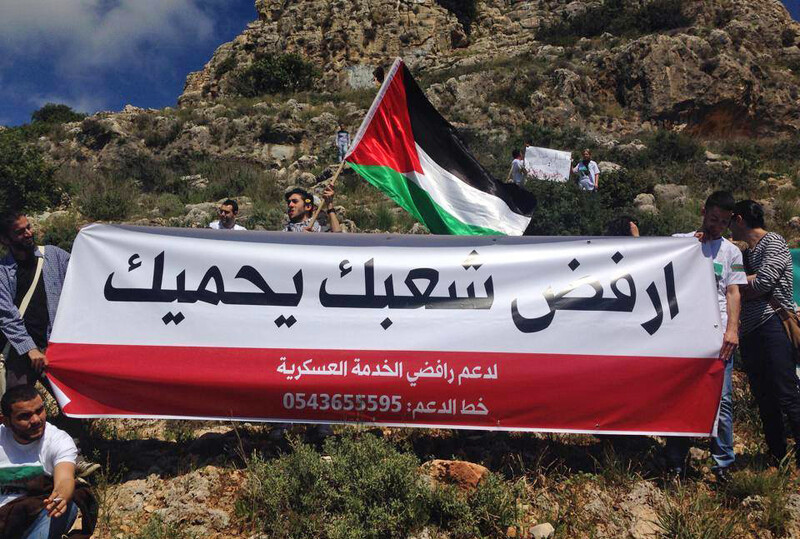The Electronic Intifada Rama 9 January 2015

“Urfod” campaigns under the banner “Refuse - your people will protect you.” (Image via campaign’s Facebook page)
Palestinians in Israel campaigning under the banner of “Refuse, your people will protect you” say they are gaining momentum in their efforts to abolish the military draft of youths from the Druze religious minority.
The campaign, which goes by Urfod (“Refuse” in Arabic), was launched in early 2013, and held its second conference recently in Rama, a village in the Galilee region of historic Palestine.
The home of the Palestinian resistance poet Samih al-Qasim, who died last year, Rama has a proud, decades-long history of activism against the conscription of Druze to Israel’s military.
During the conference Urfod activists led a tour around the village. Included was the home of the activist Assem al-Khatib, who initiated a movement against conscription of Druze in the early 1970s. Al-Khatib partnered with the poet al-Qassim to encourage Druze youth to work against the law.
Thousands of signatures from community members protesting the law were gathered before state harassment and imprisonment put an end to the mobilization.
“Long journey”
Unlike the majority of the estimated 1.7 million Palestinians in Israel, Druze youths have been required to serve in the army since the 1950s. As part of its divide-and-rule strategy to suppress Palestinian nationalism, Israel has designated the Druze as a national group distinct from the rest of the Palestinian community in the state.
Israel is now attempting to drive further sectarian wedges by pressuring young Christians to enlist in the military.
“We do not take this struggle for granted or underestimate it. It will be a long journey,” campaigner Awan Ali told The Electronic Intifada. “It will end when the military enlistment law of the Druze ends. We will not stop until this law drops.
“Most of us are in the beginning of our twenties and thirties,” Ali added. “We have all the energy and power to continue on until we succeed and ensure a dignified future for our children alongside the rest of the Palestinian nation.”
Conference participants stressed that the campaign has implications beyond the Druze community, and not only Druze Palestinians have a stake in abolishing the draft.
“It is a general responsibility for all of us to succeed in bringing the law down, not only the Druze,” said youth activist Suheil Haddad. “This campaign began tens of years ago here in Rama and we have an obligation to join work with you,” he told the recent conference.
Educational benefits?
Many benefits such as access to higher education are conditional on serving in the Israeli army. But Palestinian groups in Israel which are conscripted to the military are poorly represented in Israeli universities — the Druze and Bedouin communities rank last in enrollment.
The general lack of representation of Palestinians in Israeli academia is also reflected in the makeup of faculty and administration, explained Jabir Asaqla, co-director of Sikkuy, a campaign group based in Jerusalem.
Though Palestinians make up about twenty percent of the population of Israel, there were only 23 Palestinian lecturers at the University of Haifa in 2012, or 3.9 percent of the total faculty, according to data from a recent Sikkuy survey presented by Asaqla at the Urfod conference.
The numbers of Palestinian instructors for that same year only dwindle at Israel’s other universities: seven at the Israel Institute of Technology or Technion, as it is better known (1.25 percent of faculty); fourteen at Tel Aviv University (1.5 percent); two at Bar-Ilan University (0.3 perecent); 25 at Ben-Gurion University of the Negev (3 percent); and ten lecturers at the Hebrew University in Jerusalem (1 percent).
The total number of all Palestinian lecturers across Israel was only 82 — 1.75 percent of all faculty in Israeli universities.
Meanwhile, only 72 of 8,141 administrative positions at Israeli universities were held by Palestinian citizens and nineteen of 990 board of governors seats. And only three of the 147 seats of the universities’ executive committees — the body which reviews the appeals of Palestinian students who are punished for political activism on campus — are held by Palestinians.
Question of conscience
For the young person facing the draft, the decision to refuse is not easy and support is lacking, seventeen-year-old Fadi Daher told The Electronic Intifada. Honored at the Urfod conference for his refusal to enlist, Daher said that “the question was whether my humanity and conscience would allow me to hold a weapon against my people, and the answer was no.”
“My journey is not easy, my family was not very approving, nor is my village, and I hate to see others go through what I endured. I will share and guide other youth of my experience and will volunteer with Urfod because it is the right thing to do,” he added.
The Urfod campaign raises scholarship money and other types of support for Druze youth like Daher who refuse to enlist. Seven scholarships were awarded at the conference and study abroad opportunities in Russia were announced.
“Maybe we should send you to hell”
Khaled Farrag, one of the founding team of Urfod from Rama, and co-director at the Grassroots Jerusalem community organization, explained the pressure and difficulties of the campaign: “The Israeli media did an interview at the beginning of our campaign and the interviewer directly said to our activist, ‘Maybe we should just send you to hell.’”
Farrag was referring to a discussion on Druze army enlistment that was aired on national 103 FM radio program Five in the Evening. A debate was held between Urfod activist Hadiya Kayoof and a high-ranking Arab soldier in the army.
By the end of the show, the interviewer — prominent right-wing journalist Ben Caspit — made a remark backing the soldier, saying that “statistics say 90 percent of Druze serve in the IDF [Israel’s army] and thanks to rational people like our guest on this show who take a look around and realize that the Jewish state is sort of heaven on earth.”
Kayoof replied that “the Jewish state is not any heaven.” The interviewer shot back: “So maybe we should just send you to hell.”
Even though Israeli media like 103 FM radio claim there is a high rate of Druze enlistment in the military, many youth from the community have refused to serve in recent years. It is widely believed that the Israeli government does not give figures on enlistment in order to hide falling numbers from public discourse and to avoid encouraging more youths to refuse the draft.
No comprehensive research on Druze army refusal has been undertaken by nongovernmental groups.
Challenging media representation of the Druze community as monolithically loyal to the state and its army is also a task of the Urfod campaign.
“[Israeli media] rather thrive on Druze military soldiers who participated in the war on Gaza or during military operations in East Jerusalem and portray the Druze as loyal to the state and its military, and we have to break this image,” Farrag said.
“It is not easy but we’re already witnessing progress,” he added.
This progress includes a change of fellow Palestinians’ perception of the Druze community.
“There is a growing awareness in the Palestinian streets of the change occurring amongst the Druze community in terms of growing [Palestinian] patriotism and the Urfod campaign,” Farrag said, citing outreach efforts in the occupied West Bank, including East Jerusalem.
“We are succeeding in this aspect, and it is a great accomplishment.”
Sawsan Khalife’ is a political activist and journalist from Shefa Amr in the Galilee region of Palestine.
Tags
- conscientious objection
- conscientious objectors
- Refuse, Your People Will Protect You
- Druze
- Urfod
- Rama
- Palestinians in Israel
- Samih al-Qasim
- Assem al-Khatib
- Awan Ali
- Suheil Haddad
- education
- Israeli academia
- Sikkuy
- Jabir Asaqla
- University of Haifa
- Technion
- Tel Aviv University
- Bar-Ilan University
- Ben-Gurion University of the Negev
- Hebrew University
- Fadi Daher
- Khaled Farrag
- Ben Caspit
- Hadiya Kayoof





